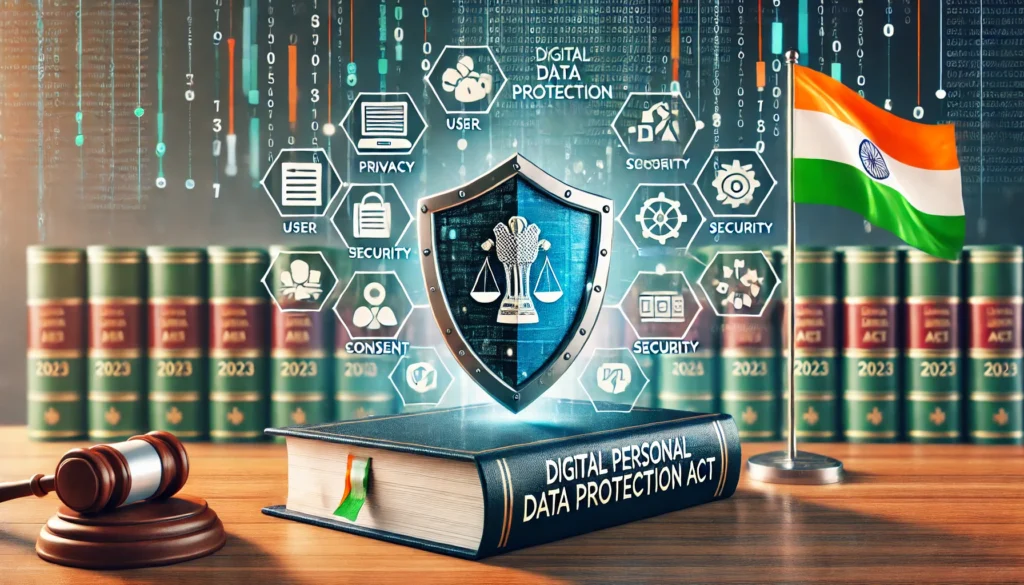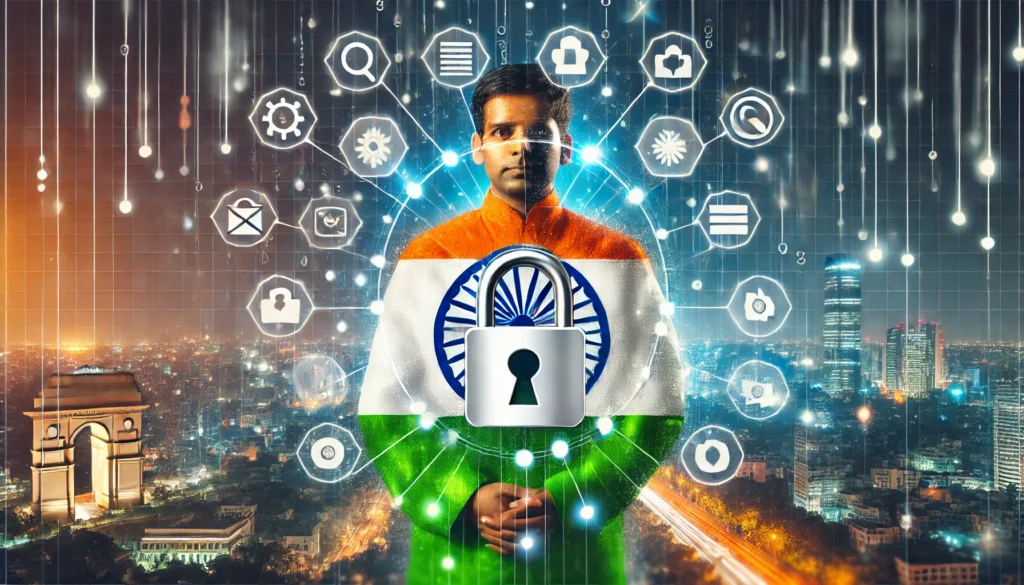Introduction:
With the rise in digital transactions and data exchanges, the Digital Personal Data Protection Act 2023 (DPDPA) is India’s latest legislative step toward securing personal data. Designed to provide individuals with more control over their personal information, the DPDPA addresses privacy concerns and establishes rules for data collection, processing, and sharing. This blog breaks down the essentials of the act and what it means for individuals and businesses alike.

What is the Digital Personal Data Protection Act 2023?
The DPDPA 2023 is a comprehensive data privacy law focusing on protecting individuals’ personal information in India. It sets specific obligations on businesses and data controllers, ensuring data is collected and processed fairly, with individual consent and transparency. This Act is especially important as digital platforms grow, making personal information more vulnerable to misuse or unauthorized access.
Key Provisions of the DPDPA 2023
- Consent-Driven Data Collection: Under the act, organizations must obtain clear consent from individuals before collecting personal data. Consent must be explicit, freely given, and withdrawable at any time.
- Right to Access and Correction: Individuals have the right to access their data and request corrections if information held by an organization is inaccurate or outdated.
- Data Protection Officer: Organizations are required to appoint a Data Protection Officer (DPO) responsible for compliance with data protection laws and addressing grievances.
- Data Minimization and Purpose Limitation: Only essential data should be collected, and it should be used strictly for the purpose it was collected for.
- Penalties for Non-Compliance: The DPDPA introduces steep penalties for businesses that violate data protection laws, with fines ranging up to several crores for serious breaches.
What Does This Mean for Individuals?
For the general public, the DPDPA 2023 grants significant rights over personal data. Individuals now have greater transparency and control over how their data is used and stored, with the ability to request deletion of data if it’s no longer needed. Furthermore, companies are obligated to keep data secure and protected against cyber threats, reducing the risk of identity theft and data breaches.
How Does This Affect Businesses?
For businesses, especially those in e-commerce, finance, and tech, the DPDPA represents a new regulatory framework for handling customer data. Companies are now required to ensure data protection compliance and implement strict cybersecurity measures. The requirement to appoint a DPO, establish data handling procedures, and maintain a record of data processing activities adds to operational responsibilities but ensures better customer trust and security.
Challenges and Implications
Implementing the DPDPA’s regulations poses challenges, particularly for small and medium-sized enterprises that may lack the resources for robust data protection systems. Additionally, companies will need to invest in employee training, updating privacy policies, and tech solutions to comply with these data protection requirements.
Conclusion:
The Digital Personal Data Protection Act 2023 marks a crucial step in India’s journey towards stronger digital privacy protections. For individuals, it’s a positive move toward safer and more transparent digital interactions. For businesses, it emphasizes responsibility and compliance, aligning India with global data privacy standards. Staying informed and adhering to these new data protection norms will be essential for maintaining security and trust in the digital age. As technology advances, the DPDPA provides a foundation for a safer, more privacy-conscious India.
डिजिटल व्यक्तिगत डेटा संरक्षण अधिनियम 2023: आपको क्या जानना चाहिए
डिजिटल लेन-देन और डेटा एक्सचेंज में वृद्धि के साथ, डिजिटल व्यक्तिगत डेटा संरक्षण अधिनियम 2023 (DPDPA) व्यक्तिगत डेटा की सुरक्षा की दिशा में भारत का नवीनतम कदम है। यह कानून व्यक्तिगत जानकारी पर अधिक नियंत्रण प्रदान करता है और डेटा संग्रह, प्रसंस्करण, और साझा करने के लिए नियम बनाता है। आइए इस अधिनियम की मुख्य बातें जानें और यह व्यक्तियों और व्यवसायों के लिए क्या मायने रखता है

डिजिटल व्यक्तिगत डेटा संरक्षण अधिनियम 2023 क्या है?
DPDPA 2023 एक व्यापक डेटा गोपनीयता कानून है, जो भारत में व्यक्तिगत जानकारी की सुरक्षा पर केंद्रित है। यह अधिनियम व्यवसायों और डेटा नियंत्रकों पर विशेष जिम्मेदारियां रखता है, यह सुनिश्चित करता है कि डेटा उचित तरीके से एकत्र किया जाए, पारदर्शिता के साथ और व्यक्तिगत सहमति के आधार पर।
DPDPA 2023 की मुख्य विशेषताएं
- सहमति-आधारित डेटा संग्रह: इस अधिनियम के तहत संगठनों को डेटा एकत्र करने से पहले स्पष्ट सहमति प्राप्त करनी होगी। सहमति स्पष्ट और स्वतंत्र रूप से दी गई होनी चाहिए और कभी भी वापस ली जा सकती है।
- एक्सेस और सुधार का अधिकार: व्यक्तियों को अपने डेटा का एक्सेस करने और किसी भी असत्य जानकारी को सुधारने का अधिकार है।
- डेटा सुरक्षा अधिकारी: संगठनों को एक डेटा सुरक्षा अधिकारी (DPO) नियुक्त करना आवश्यक है।
- डेटा को सीमित और लक्षित उपयोग: केवल आवश्यक डेटा एकत्र किया जाना चाहिए और उसका उपयोग केवल उसके संग्रह उद्देश्य के लिए होना चाहिए।
- अनुपालन में विफलता पर जुर्माना: DPDPA डेटा सुरक्षा कानूनों का उल्लंघन करने पर भारी जुर्माना लगाता है।
व्यक्तियों के लिए इसका क्या अर्थ है?
आम जनता के लिए, DPDPA 2023 व्यक्तिगत डेटा पर महत्वपूर्ण अधिकार प्रदान करता है। व्यक्तियों को अब अधिक पारदर्शिता और नियंत्रण प्राप्त है और डेटा संग्रहण और उपयोग में सुरक्षितता को बढ़ावा दिया गया है।
व्यवसायों पर इसका प्रभाव
व्यवसायों के लिए, विशेष रूप से ई-कॉमर्स, वित्त, और टेक क्षेत्र में, DPDPA एक नया नियामक ढांचा प्रस्तुत करता है। संगठनों के लिए डेटा सुरक्षा अनुपालन सुनिश्चित करना अनिवार्य हो गया है।
चुनौतियाँ और संभावित प्रभाव
DPDPA को लागू करने के लिए विशेष रूप से छोटे और मध्यम उद्यमों के लिए चुनौतियाँ पेश आती हैं जिन्हें मजबूत डेटा संरक्षण प्रणालियों की आवश्यकता है।
निष्कर्ष:
डिजिटल व्यक्तिगत डेटा संरक्षण अधिनियम 2023 भारत की डिजिटल गोपनीयता सुरक्षा की यात्रा में एक महत्वपूर्ण कदम है। व्यक्तियों और व्यवसायों दोनों के लिए यह सुरक्षित और अधिक गोपनीयता-सम्बंधित डिजिटल इंटरैक्शन सुनिश्चित करता है।
Follow my website for more interesting and insightful blogs!
